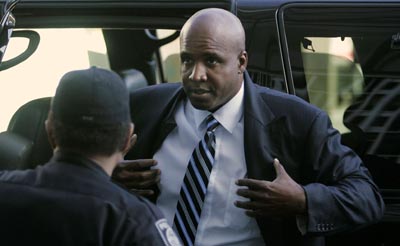
Documents positive drug tests that prosecutors linked to
Bonds
SAN FRANCISCO
A federal judge on Wednesday unsealed hundreds of pages of court documents at the heart of the government’s criminal case against Barry Bonds, including positive drug tests that prosecutors linked to the home run king.
The documents also include a transcript of a taped conversation between Bonds’ personal trainer and personal assistant discussing injecting the slugger, plus a list of current and former major leaguers, including Jason Giambi, who are scheduled to testify for the government at Bonds’ upcoming trial.
The former San Francisco Giants is charged with lying to a grand jury when he said he never knowingly used performance-enhancing drugs. His trial is scheduled for next month.
Federal prosecutors allege that Bonds used steroids, including a once undetectable designer drug.
In the court documents, prosecutors say Bonds tested positive in 2000 and 2001 for the steroids methenelone and nandrolone. Prosecutors want to use those test results to show Bonds lied when he told a grand jury in December 2003 that he never knowingly used steroids.
In addition, a government-retained scientist said he found evidence that Bonds used the designer steroid THG upon retesting a urine sample Bonds supplied as part of baseball’s anonymous survey drug testing in 2003.
Major League Baseball contracted Quest Diagnostics and Comprehensive Drug Testing to carry out its anonymous drug testing in 2003. In April 2004, federal agents obtained a search warrant and seized urine samples held by Quest in Nevada and codes to match the samples from CDT in Long Beach, Calif.
When agents discovered a spreadsheet containing a list of all players who tested positive, they obtained a second search warrant and seized all samples. The legality of the second search remains in dispute, with three district court judges ruling for the Major League Baseball Players Association and the 9th U.S. Circuit Court of Appeals holding an en-banc hearing in December on the government’s appeal.
–
Story by Paul Elias, Associated Press Writer









